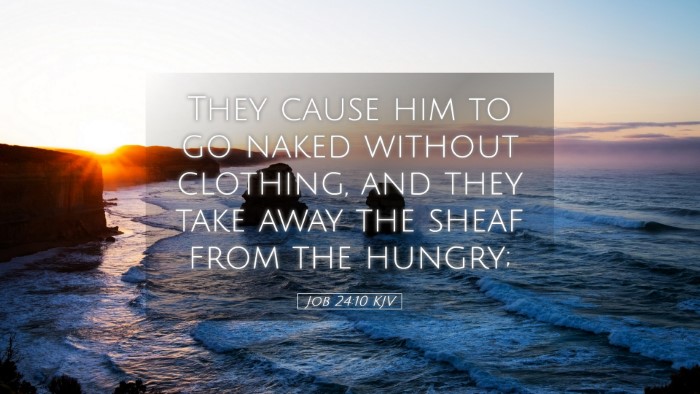Old Testament
Genesis Exodus Leviticus Numbers Deuteronomy Joshua Judges Ruth 1 Samuel 2 Samuel 1 Kings 2 Kings 1 Chronicles 2 Chronicles Ezra Nehemiah Esther Job Psalms Proverbs Ecclesiastes Song of Solomon Isaiah Jeremiah Lamentations Ezekiel Daniel Hosea Joel Amos Obadiah Jonah Micah Nahum Habakkuk Zephaniah Haggai Zechariah MalachiJob 24:10
Job 24:10 KJV
They cause him to go naked without clothing, and they take away the sheaf from the hungry;
Job 24:10 Bible Commentary
Commentary on Job 24:10
Job 24:10 (KJV): "They cause him to go naked without clothing, and they take away the sheaf from the hungry."
Introduction
The Book of Job is a profound exploration of suffering, justice, and divine sovereignty. In Job 24:10, the verse highlights a troubling aspect of social injustice and the plight of the impoverished. Commentators from different eras have expounded upon this text to reveal its layered meanings. Insights gleaned from Matthew Henry, Albert Barnes, and Adam Clarke will provide a robust understanding suitable for pastors, students, theologians, and Bible scholars.
Contextual Background
Job 24 presents Job's response to his friends, addressing the apparent prosperity of the wicked and the suffering of the righteous. The discrepancy between observable reality and perceived divine justice is at the heart of this chapter. In verse 10, Job reflects on how the oppressors and wealthy exploit the less fortunate. This insight leads us to better understand the righteousness and omniscience of God amid human suffering.
Commentary Insights
-
Matthew Henry: A Reflection on Human Disparities
Matthew Henry emphasizes the stark contrast in social status among humanity. He highlights that the "naked" in this verse symbolizes not just physical deprivation but spiritual and moral destitution as well. Henry notes that this nakedness is occasioned by the wickedness of others who swindle the needy, stripping away their dignity. He indicates that this suffering prompts serious reflection on God's justice and mercy.
-
Albert Barnes: Examination of Injustice
Albert Barnes provides an examination of the inhumanity faced by the poor, underscoring that their plight often occurs at the hands of those who exploit their vulnerability. He points out that the "sheaf" taken from the hungry illustrates a total disregard for the needs of the needy. Barnes stresses that this highlights humanity's propensity for cruelty and calls attention to God’s eventual judgment, assuring that divine justice will ultimately prevail, even if delayed.
-
Adam Clarke: The Suffering of the Innocent
Adam Clarke reflects deeply on the suffering of innocents, connecting it to the broader biblical narrative of the oppressed. He identifies the issues of social justice within the passage and exhorts the readers to consider the plight of the less fortunate in their own society. Clarke argues that this suffering is not unnoticed by God, invoking a sense of hope amidst despair for those who feel abandoned.
Theological Implications
The theological implications of Job 24:10 are vast, particularly in relation to concepts of justice, theodicy, and human vulnerability. The verse serves as a reminder of the reality of social injustice and human suffering. The orthodox belief in a just God is challenged by the experiences of those who are exploited. Thus, the commentators urge the faithful to align themselves with God’s heart for the poor and to take action against injustice.
Applications for Christian Living
The insights from this verse carry practical applications for Christians
-
Advocacy for the Oppressed:
As Job laments the condition of the needy, believers are called to advocate for social justice and care for the marginalized in society. This is an imperative consistent with biblical teaching found throughout scripture, urging the faithful to defend those who cannot defend themselves.
-
Awareness of Social Issues:
Pastors and church leaders should educate their congregations on social issues that lead to inequity and exploit the poor. By raising awareness, the church can lead in creating environments of compassion and support for those experiencing poverty and exploitation.
-
Empathy and Action:
In reading and reflecting on Job 24:10, Christians are reminded to cultivate empathy for those who suffer. This chapter encourages actions that address inequality and poverty, promoting engagement with local communities to help meet their needs.
Conclusion
In conclusion, Job 24:10 is a powerful testament to the realities of human suffering and social injustice. The shared insights from Matthew Henry, Albert Barnes, and Adam Clarke enrich our understanding of this troubling reality. It prompts scholarly engagement with the text while encouraging practical implementations in the faith community. Ultimately, the message of this verse calls the faithful to reflect divine justice and compassion within a broken world.


